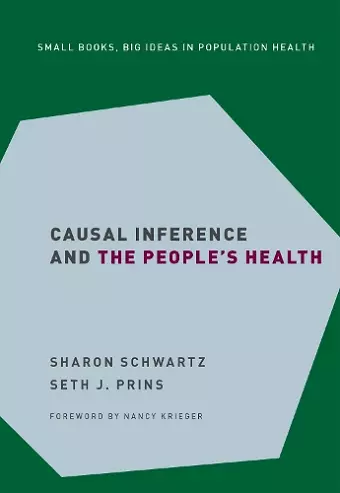Causal Inference and the People's Health
Sharon Schwartz author Seth J Prins author
Format:Hardback
Publisher:Oxford University Press Inc
Published:23rd Apr '25
Should be back in stock very soon

An essential introduction to concepts of causation and causal inference that explores how our definitions of causes in epidemiology influence how we go about finding them and estimating their effects. A key goal of epidemiologic research is to uncover the causes of diseases and other health-related outcomes. But exactly what we mean by a "cause" and what types of phenomena qualify as causes, differ across historical periods, and is a contentious topic. The causal status of social phenomena has been, and continues to be, particularly precarious. In Causal Inference and the People's Health, Sharon Schwartz and Seth J. Prins offer both a synthesis of the dominant school of thought around causality and propose an approach that keeps causal concepts as an organizing principle without marginalizing social phenomena. The authors examine the implications of the "Causal Revolution,"--introduced in epidemiology as the Potential Outcomes framework--which initiated a paradigm shift across the social sciences. As the authors show, this shift influences the questions we ask, the methods we use, the narratives we construct about our study results, and thus the knowledge we use to fight for the people's health. The guiding principle of the Causal Revolution is simple but profound: researchers should specify if their goal is description, prediction, or causation. In other words, researchers should declare their causal goals even for observational studies. This principle not only produced important innovations, but it also reignited debates about the definition of causation, the causal status of important social constructs like class and gender, and the role of manipulation or intervention in causal inference. Interrogating these debates and embracing causal questions that identify and explain etiologic processes, Causal Inference and the People's Health offers a path forward that expands causal inference to include social forces as causes of the people's health, and therefore reinvigorates epidemiology's historical role in targeting systems and structures for change.
The Causal Revolution has greatly advanced epidemiology's understanding of causal effects, but the cost of advancement has been to narrow the scope of permissible questions. In their excellent book, Schwartz and Prins propose a solution: a theoretical framework integrating the strengths of modern causal inference with sociologic and epidemiologic theory. * Eleanor Murray, Assistant Professor of Epidemiology, Boston University School of Public Health *
Insightful, intellectually honest, and a pleasure to read. Concisely unpacks recent debates on causal inference, and provides a path forward for a scientifically rigorous epidemiology that still generates knowledge about how the social world impacts health so that we as a society can decide what to do about it. * Ana V. Diez Roux, Distinguished University Professor of Epidemiology and Director of the Urban Health Collaborative, Drexel University Dornsife School of Public Health *
This book is a true gem. It illuminates the most fundamental questions we face about the uses of epidemiology to improve health and expand human rights. Exceptionally profound and scholarly, yet written with extraordinary clarity, it is accessible to anyone who wants to learn about or engage with these questions. * Ezra Susser, Professor of Epidemiology and Psychiatry, Columbia University, and New York State Psychiatric Institute *
ISBN: 9780197528587
Dimensions: 168mm x 109mm x 28mm
Weight: 340g
320 pages